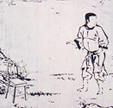Deaf, Dumb, and Blind Justice
Abu Bakker Qassim and A'del Abdu Al-Hakim, despite their names, are Chinese. They wouldn’t call themselves that, however. They are ethnic Uighurs*, from what they call East Turkistan. Uighurs are generally pro-American because they have experienced religious persecution in China. Abu Bakker Qassim and A'del Abdu Al-Hakim are Muslims. Fate threw them together and the United States has kept them together since then.
In 2001, they fled China and set out for Turkey in hopes of finding work. Then came 9/11. They were in Pakistan when the U.S. attacked Afghanistan. We had a bounty on “terrorists” — $5000 a head. Someone in Pakistan saw $10,000 of easy money, tipped off the U.S.; and we bought them in January of 2002.
They were sent first to Kandahar and then Guantanamo, where they are now. A few months ago, they finally had their day in court, albeit a secret military proceeding, and they were found innocent.
In secret trials, however, even the verdict is secret. Their lawyer, Sabin Willet, learned of the ruling only last month, and only because he finally had a chance to meet his clients. They were restrained by leg irons bolted to the floor — for Willet’s protection, of course. Having been cleared, Qassim and Al-Hakim could not understand why they were still in prison.
The government contends, rightly, that we cannot return them to persecution in China; and, reportedly, that no other country will take them. However, I can think of at least one country that could take them; there are Uighers in the United States. But we won’t. We won’t even release them to live in the civilian community at Guantanamo. We won’t let them phone their families. The administration argues that the president’s war powers include the power to hold and release suspected enemy combatants in an appropriate fashion. The catch, of course, is that Qassim and Al-Hakim are not and have never been enemy combatants. A military tribunal found that they were simply in the wrong place at the wrong time.
They still are.
* Pronounced wee’gur, it is also spelled Uygher, Uyghur, and Uygur
In 2001, they fled China and set out for Turkey in hopes of finding work. Then came 9/11. They were in Pakistan when the U.S. attacked Afghanistan. We had a bounty on “terrorists” — $5000 a head. Someone in Pakistan saw $10,000 of easy money, tipped off the U.S.; and we bought them in January of 2002.
They were sent first to Kandahar and then Guantanamo, where they are now. A few months ago, they finally had their day in court, albeit a secret military proceeding, and they were found innocent.
In secret trials, however, even the verdict is secret. Their lawyer, Sabin Willet, learned of the ruling only last month, and only because he finally had a chance to meet his clients. They were restrained by leg irons bolted to the floor — for Willet’s protection, of course. Having been cleared, Qassim and Al-Hakim could not understand why they were still in prison.
The government contends, rightly, that we cannot return them to persecution in China; and, reportedly, that no other country will take them. However, I can think of at least one country that could take them; there are Uighers in the United States. But we won’t. We won’t even release them to live in the civilian community at Guantanamo. We won’t let them phone their families. The administration argues that the president’s war powers include the power to hold and release suspected enemy combatants in an appropriate fashion. The catch, of course, is that Qassim and Al-Hakim are not and have never been enemy combatants. A military tribunal found that they were simply in the wrong place at the wrong time.
They still are.
* Pronounced wee’gur, it is also spelled Uygher, Uyghur, and Uygur


0 Comments:
Post a Comment
<< Home